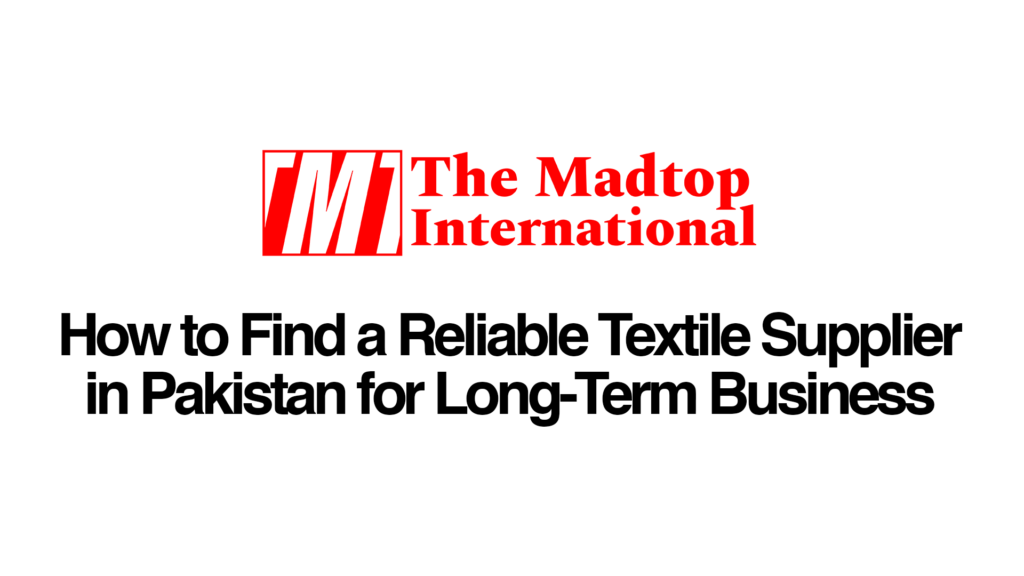Table of Contents
Pakistan is one of the world’s leading textile exporters, supplying high-quality fabrics at competitive prices. If you are planning to import fabrics from Pakistan, understanding the process can help you avoid delays and ensure a smooth transaction. This guide provides a step-by-step approach to successfully importing fabrics from Pakistan.
1. Research & Identify the Right Supplier
Finding a reliable textile supplier is the first step in the import process. Follow these steps to identify the right partner:
✔ Use Online B2B Platforms – Websites like Alibaba, Tradekey, and Global Sources list verified textile manufacturers from Pakistan.
✔ Attend Trade Shows – Events like Textile Asia (Pakistan), Heimtextil (Germany, Dubai), and Domotex provide opportunities to meet suppliers in person.
✔ Request Fabric Samples – Always ask for samples before placing bulk orders to assess quality.
✔ Verify Business Credentials – Conduct due diligence by checking the supplier’s export history, reviews, and past client references.
2. Understand Fabric Specifications & Requirements
Before placing an order, you need to determine your specific fabric requirements. Consider the following:
✔ Type of Fabric – Cotton, polyester, denim, blended fabrics, or technical textiles.
✔ GSM (Grams per Square Meter) – This determines fabric weight and durability.
✔ Weave Type – Woven vs. knitted fabrics, based on the end use.
✔ Dyeing & Finishing – Colorfastness, shrinkage control, and other treatments.
✔ MOQ (Minimum Order Quantity) – Ensure that the supplier can meet your required quantity.
3. Negotiate Pricing & Payment Terms
Once you’ve selected a supplier, discuss pricing and payment terms:
✔ Compare Quotes – Get multiple quotes to negotiate competitive pricing.
✔ Discuss Payment Options – Most suppliers accept Telegraphic Transfer (T/T), Letter of Credit (L/C), and PayPal (for smaller orders).
✔ Check for Additional Costs – Freight charges, customs duties, and taxes should be factored into your budget.
4. Place Your Order & Sign a Contract
A well-documented contract helps prevent disputes. Ensure your purchase agreement includes:
✔ Fabric specifications (GSM, composition, color, width, finish, etc.)
✔ Agreed pricing & payment terms
✔ Delivery timeline & shipping method
✔ Quality control measures & return policy for defective goods
5. Arrange Shipping & Logistics
Choosing the right shipping method depends on your budget and urgency:
✔ Air Freight – Faster but more expensive; ideal for urgent orders.
✔ Sea Freight – Cost-effective for bulk shipments but takes longer (typically 3–6 weeks).
✔ Freight Forwarder Assistance – Consider hiring a freight forwarder to handle customs clearance and logistics.
✔ Ensure Proper Packaging – Fabrics should be packed in moisture-resistant wrapping to prevent damage during transit.
6. Understand Customs & Import Regulations
Every country has its own import policies. To avoid customs delays, follow these steps:
✔ Check Import Duties & Taxes – Review your country’s tariff rates for textile imports.
✔ Ensure Proper Documentation – Essential documents include:
- Commercial Invoice
- Packing List
- Bill of Lading (for sea freight) or Airway Bill (for air freight)
- Certificate of Origin]
- ✔ Comply with Local Regulations – Some countries require compliance with specific textile import regulations, such as labeling and safety standards.
7. Receive Your Shipment & Conduct Quality Inspection
After receiving the shipment, check for:
✔ Correct fabric type, color, and quantity
✔ No damage or defects
✔ Proper labeling and packaging
If any issues arise, contact the supplier immediately for resolution.
8. Build a Long-Term Relationship with Your Supplier
A strong relationship with a reliable supplier ensures smoother transactions in the future. Tips for maintaining a good partnership:
✔ Communicate Clearly & Frequently – Keep open communication about future orders and expectations.
✔ Provide Feedback – Share your experience to improve product quality.
✔ Negotiate Better Terms for Bulk Orders – Long-term partnerships can help you get better pricing and priority service.
9. Why Choose Madtop International for Fabric Imports?
At Madtop International, we specialize in exporting high-quality textiles with seamless supply chain management. Our services include:
✔ A wide range of fabrics – Cotton, polyester, home textiles, and more.
✔ Custom fabric solutions – Tailored to your specific business needs.
✔ Competitive pricing & flexible payment terms
✔ Reliable shipping & logistics support
✔ Dedicated customer service to assist with orders and inquiries
10. Conclusion
Importing fabrics from Pakistan can be a profitable business opportunity if done correctly. By following this step-by-step guide, you can ensure a hassle-free import process and secure a reliable textile supply for your business.
📩 Looking for a trusted textile supplier? Contact Madtop International today!


